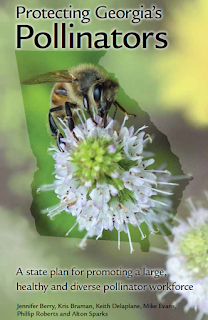 With some humor, the University of Georgia's College of Agricultural and Environmental Sciences has released "a state plan for promoting a large, healthy and diverse pollinator workforce (link to pdf)."
With some humor, the University of Georgia's College of Agricultural and Environmental Sciences has released "a state plan for promoting a large, healthy and diverse pollinator workforce (link to pdf)." Why focus on pollinators? The plan states that "A 2014 economic impact study by the University of Georgia determined that the annual value of pollination to Georgia is over $360 million."
Becky Griffin at UGA also offers the following recommendations:
"- If possible leave areas of your property permanently undisturbed for soil-nesting bees.
- Dedicate pollinator habitat spaces in your garden.
- Know the beekeepers in your area.
- Educate your gardeners about insect behavior.
- Consider increasing bee nesting sites by providing bee homes.
- Follow all pesticide label directions and precautionary statements."
- If there's a need to apply insecticide for turf pests, mow the grass to remove weed flowers that may attract bees, THEN apply the insecticide. This makes it less likely that beneficial pollinators will be hurt by the insecticide.
For much more info on honeybees, see http://ent.uga.edu/bees/
